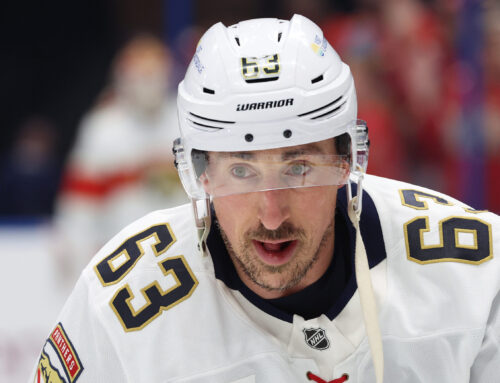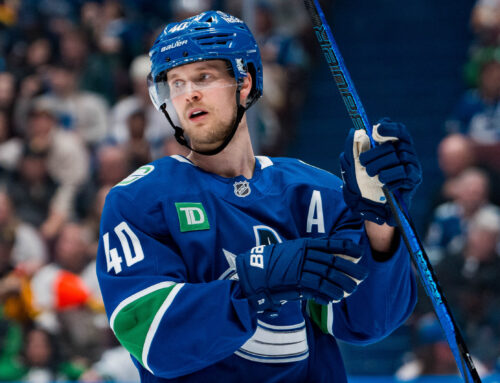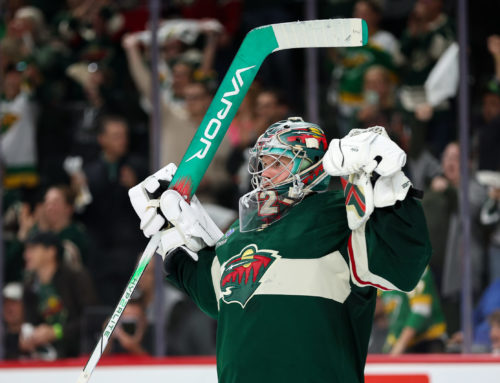
Colorado has signed forward Valeri Nichushkin to a one-year deal.
The now-24-year old winger returned to Dallas for the 2018-19 after spending a couple years in Russia. It didn’t exactly go well, as he posted zero goals in 57 games while playing mostly third- and fourth-line minutes, and sometimes a healthy scratch.
I do not anticipate much fantasy relevance here. It’s not to say he can’t, but at the least he’ll probably start at the bottom of the roster and work his way up. He just doesn’t shoot the puck and there’s some data (shot assists) that suggest he struggles at finding teammates in the offensive zone. A guy who doesn’t shoot and can’t rack up helpers isn’t likely to breed much fantasy success. I think it’s a good signing because it gives them cheap depth and he can be solid defensively, but there’s just not much here for fantasy.
*
The Islanders signed Josh Ho-Sang to a one-year deal and Michael Dal Colle to a two-year deal. At this point, I just wish the Islanders would let Ho-Sang catch on somewhere else.
*
Be sure to grab your copy of the 2019-20 Dobber Hockey Fantasy Guide from the Dobber Shop today! It has everything that fantasy owners need to succeed and is constantly updated through training camp.
*
I sit here in the middle of August and still cannot figure out what the Rangers are going to do with their lines. Mika Zibanejad is the 1C for sure. But do they use Kakko with Ziba, presumably against other top lines? Or do they have Buch up with Ziba and try to hide Kakko and Kravtsov, but leaving them with lesser line mates? Is Kreider on the roster in October? Who in the name of all that is holy is going to be their second-line centre?
This really does feel like guesswork until training camp. There are so many new faces and unproven players that it’s hard to figure out how all the pieces will fit.
*
(Note: this rant ended up longer than I wanted but I didn't want to just gloss over an important subject.)
I noticed a tweet on Saturday night that was fairly innocuous. It was this, just a tweet about over/under goal totals for certain Golden Knights forwards this year, and one for Marc-André Fleury’s win total:
2019-20 VGK Regular Season propositions
Goals scored by:
Mark Stone 31.5
Max Pacioretty 27.5
William Karlsson 24.5
Jonathan Marchessault 24.5
Alex Tuch 19.5
Paul Stastny 14.5
Reilly Smith 17.5Wins by:
Marc-Andre Fleury 31.5
— Jeff Sherman (@golfodds) August 17, 2019
This led me to check to check my projections. While my projections are going to change, as of right now this is what I have in relation to those goal totals:
- Stone – over
- Pacioretty – under
- Karlsson – under
- Marchessault – over
- Tuch – under
- Stastny – over
- Smith – over
Some people might say, “just bet all those overs and unders.” The thing is, of those seven players and their accompanying goal totals, my projections are within a goal of six of them. This is what my projections look like:
|
Player |
Book Total |
My Projection |
|
Stone |
31.5 |
32.4 |
|
Pacioretty |
27.5
📢 advertisement:
|
26.9 |
|
Karlsson |
24.5 |
24.2 |
|
Marchessault |
24.5 |
25.3 |
|
Tuch |
19.5 |
18.8 |
|
Stastny |
14.5 |
15.0 |
|
Smith |
17.5 |
20.2 |
That last name is bolded/italicized for a reason. Reilly Smith is the guy where my projection is way ahead (or way behind) the total from the tweet, and I want to talk about that for a minute. Let’s start with the total itself.
Smith became a fulltime NHLer in 2013-14, giving us six full seasons to work with. In those six seasons, he’s played 466 games and scored 114 goals. That works out to 0.245 goals per game, or 20.1 goals every 82 games. It’s been four seasons since Smith has earned consistent top-6 minutes, and in those four seasons, he’s played 303 games and scored 81 goals. That works out to 0.267 goals per game, or 21.9 goals per 82 games. Even if you’re concerned about injury – he’s averaged about 70 games played a year since getting to Vegas – a goals/game rate of 0.267 for 70 games works out to 18.7, and that's still more than a goal over the betting total of 17.5.
When I started figuring all this out – yes, on a Saturday night, what a crazy life I lead – red flags started going off in my head. My operating assumption is the people putting together gambling totals for others to bet on are pretty good at what they do, and generally offer lines that tempt people to bet both sides, which usually means it’s a good number. It’s why six of the seven totals are very close to my projections (not saying my projections are good, but most people are working with the same data, so a lot of numbers won’t be too far off). Those totals I have no interest in betting. But that Smith total feels so far off that I’d be stupid not to bet it.
When all this started running through my head, I went and talked to a betting friend of mine. He’s been doing this for years for a lot of money and he’s a winning player. (That last part is important, and I’ll get back to it.) I asked him if I was missing something. It seemed to me that the number was bad and an easy bet, so maybe there’s something under the surfaced I missed? Namely, I wanted to know if this meant that the book thinks Smith will be spending a lot of time on the third line in favour of Tuch. A loss of top line mates and top minutes would be enough to depress a goal total. He told me that while he can’t say for sure one way or another about the book’s thought process, that it’s probably not that deep; if I think it’s a bad number, it’s probably just a bad number.
This all brings me to two points, and they’re intertwined.
First, I’m not a sports bettor. I player season-long and daily fantasy. All three are completely different from each other:
- Season-long fantasy requires accurate preseason projections and active in-season management. It’s important to find an edge both at the draft table and throughout the year be it in trades or the waiver wire. You need relatively deep knowledge of the player pool as well.
- Daily fantasy requires accurate projections and the latest (literally by the minute) information, but you’re also playing against, potentially, thousands of other humans. Needing to find edges, largely in ownership rates, is necessary, and nearly the same process is applied day after day for months on end.
- Hockey betting is a chase for closing line value. Basically, can you find bad book numbers – numbers that seem really far off what they should be – and bet them before they’re adjusted? If your model says Nashville is 59 percent to win at home to Winnipeg on a given night, and books have them at 50 percent, you need to bet them before the market catches up. Once the market catches up, your value is gone.
I don’t have a model running simulations of games. It’s just not necessary for fantasy hockey. I’m sure it would help in some regards, like streaming goalies or finding sneaky high-scoring games, but you can just use Vegas odds for that anyway. Because I don’t have the tools necessary to bet games, I don’t bet games, and I don’t tell people which games they should bet.
This also led to a larger conversation with my friend, namely around sports betting in the media, which is my second point. As readers have undoubtedly seen, everyone is getting into sports betting. Leagues and teams are getting sponsorships, mobile betting is being offered in some stadiums, legalization is rolling through the United States, and the result is that myriad TV shows, radio programs, and podcasts have popped up. That could be a great thing, but the issue is there aren’t a lot of profitable sports bettors to rely on to disseminate accurate information to the public. If there were, more people would be doing it professionally. It’s hard. It’s very, very hard. And it goes far beyond win/loss totals for your bets. Just posting, “I’ve won 35 of 50 bets made this month” is meaningless unless we know how much each bet was and what the line was for each bet. It’s not hard to win 70% of your bets and still be a losing player depending on bet sizing and line value. That’s why posting what the plays are, what the line was, and the bet size more important and gives a better idea of actual wins and losses, and that’s why some people just now popping up on podcasts and TV shows post win/loss records instead of units. (There are other measures to use, I’m just saying units because it’s likely the most familiar to the reader.) If they posted their unit win/loss (likely loss), no one would listen to them. Also, one week, or one month, or even one season isn’t enough to determine a winning/losing player in the long run.
Some people aren’t necessarily looking to win when they bet or play fantasy sports. They’re looking for something to take their mind off real life for a few hours and maybe want some camaraderie. And that’s just fine! People have the right to take away from it what they want and if they just want an entertaining pod with, that’s their prerogative. But if you’re someone really looking to win, be very careful about the influx of betting content coming from across the sports industry. A lot of it is not only useless, it’s actively harmful.
*
As far as that Marc-Andre Fleury win projection goes, well, I haven’t done goalie projections, but 31.5 feel odd. He’s averaged 32 wins per season since getting to Vegas and he missed about 15 starts in 2017-18.
I guess like everyone else, age has crept up here. I did not realize that Fleury is going into his age-35 season. Not to say it’s impossible, but it’s very hard for a goalie his age to reach 32 wins. Consider that since the 2013 lockout season, only twice has a goalie won 32 games in their age-35 season or later: Roberto Luongo in 2015-16 and Pekka Rinne in 2017-18. Now, that’s also because most goalies don’t last that long; there are just 10 instances of a goalie age-35 or older starting at least 50 games over the last six years.
One side of me thinks, “if Vegas is as good as I think they will be, and Fleury is healthy, he’ll get to 32 wins.” The other side of me thinks, “can he keep up his recent performance after nearly 950 games in the NHL?”
Again, I am not a sports bettor. I’m not betting either side here and I’m not recommending anyone else do that. I just find it a very interesting number for this specific player this season. What do you guys think? Over or under 31.5 wins for Fleury in 2019-20?





 FLA
FLA EDM
EDM MIN
MIN DAL
DAL UTA
UTA VAN
VAN STL
STL L.A
L.A TOR
TOR MTL
MTL
